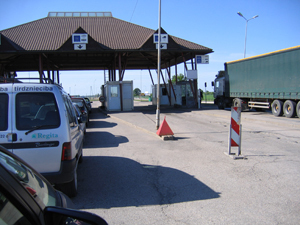LANGUAGE COPS, PARTIES CLASH OVER CAMPAIGN ADS.
Published:
29 September 1999 y., Wednesday
Estoniais language board ordered a Tallinn tram fleet to remove a political advertisement printed in both Estonian and Russian from the exterior of a tram car.The ad, the language board said, violates an election law that requires outside advertising to be printed in Estonian and only Estonian. The ad was placed by the Peopleis Trust, an electoral alliance that comprises several of Estoniais Russian parties. After the tram fleet removed the advertisement, the Peopleis Trust submitted a formal complaint against the language board to the Tallinn Administrative Court. The Estonian language law specifies that "public signs, announcements and advertisements shall be in Estonian." The National Language Board, which is charged with interpreting and enforcing the law, has interpreted this to mean "only in Estonian," excluding the possibility for translations into other languages. Urmas Veikat, assistant to the director of the National Language Board, insists that the wording of the law is quite clear on this point."If the law did allow bilingual signs, then the wording would be ein Estonian and in other languages. As it stands, only Estonian-language signs are allowed. This comes directly from paragraph 6 of the Estonian constitution, which declares Estonian the state language." Representatives of the Peopleis Trust claimed in a public statement Sept.20 that the current interpretation of the law deprives non-Estonian speakers of their right to information. Unlike in parliamentary elections, anyone with an Estonian residence permit has the right to vote in local elections. This includes approximately 300,000 Russian speakers in Estonia. Three Russian electoral unions - groups of parties who present a common list of candidates - are participating in the elections. The issue of Russian-language political advertisements arose during the parliamentary campaign last spring, when the language board ordered the Russian Party in Estonia to remove Russian-language posters. Other printed campaign materials, such as brochures and newspaper ads, may be in any language. The ban on foreign language use also does not include proper names or registered trademarks. The law holds the publisher of the advertisement, in this case the Tallinn tram fleet, responsible for not following the law.
Written by Tricia Cornell
Copying, publishing, announcing any information from the News.lt portal without written permission of News.lt editorial office is prohibited.
The most popular articles
 One in three Europeans is “very concerned” about losing their job, and even more are worried their spouse or children will find themselves out of work in the months ahead.
more »
One in three Europeans is “very concerned” about losing their job, and even more are worried their spouse or children will find themselves out of work in the months ahead.
more »
 There was plenty of action at the last meeting of the Orissa state assembly in India.
more »
There was plenty of action at the last meeting of the Orissa state assembly in India.
more »
 On Monday, the banks of the River Seine were transformed with sand and deck chairs for the opening of this year's Paris Plage.
more »
On Monday, the banks of the River Seine were transformed with sand and deck chairs for the opening of this year's Paris Plage.
more »
 In the 2008 bathing water season Lithuania is the only EU member 100 % complying with the mandatory as well as stricter coastal bathing waters’ safety requirements and standards.
more »
In the 2008 bathing water season Lithuania is the only EU member 100 % complying with the mandatory as well as stricter coastal bathing waters’ safety requirements and standards.
more »
 People around the country gathered in China's financial capital on Tuesday ahead of the eclipse that is due to start at 8:23 am local time on Wednesday.
more »
People around the country gathered in China's financial capital on Tuesday ahead of the eclipse that is due to start at 8:23 am local time on Wednesday.
more »
 Lithuania’s Acting Minister of Foreign Affairs emphasized that it was especially important for Lithuania to solve the issue of clearing the Baltic Sea from the remaining dumped chemical weapons.
more »
Lithuania’s Acting Minister of Foreign Affairs emphasized that it was especially important for Lithuania to solve the issue of clearing the Baltic Sea from the remaining dumped chemical weapons.
more »
 British backpacker Jamie Neal had been missing for 12 days in the bush. Now he arrived at a hospital in Katoomba near Australia's Blue Mountains.
more »
British backpacker Jamie Neal had been missing for 12 days in the bush. Now he arrived at a hospital in Katoomba near Australia's Blue Mountains.
more »
 The European Commission's long standing commitment to visa free travel for the people of the Western Balkans was confirmed today with the adoption of a proposal for granting visa free travel to the citizens of the former Yugoslav Republic of Macedonia, Montenegro and Serbia.
more »
The European Commission's long standing commitment to visa free travel for the people of the Western Balkans was confirmed today with the adoption of a proposal for granting visa free travel to the citizens of the former Yugoslav Republic of Macedonia, Montenegro and Serbia.
more »
 Logan Campbell from New Zealand has set up a brothel because he has an Olympic dream.
more »
Logan Campbell from New Zealand has set up a brothel because he has an Olympic dream.
more »
 About 20 protesters gathered in downtown Seoul in South Korea to demand the government abolish the tradition of eating dog meat.
more »
About 20 protesters gathered in downtown Seoul in South Korea to demand the government abolish the tradition of eating dog meat.
more »